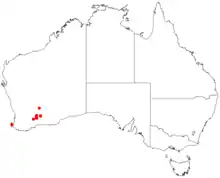| Lepidosperma amantiferrum | |
|---|---|
| Scientific classification | |
| Kingdom: | Plantae |
| Clade: | Tracheophytes |
| Clade: | Angiosperms |
| Clade: | Monocots |
| Clade: | Commelinids |
| Order: | Poales |
| Family: | Cyperaceae |
| Genus: | Lepidosperma |
| Species: | L. amantiferrum |
| Binomial name | |
| Lepidosperma amantiferrum | |
 | |
| Occurrence data from AVH | |
Lepidosperma amantiferrum is a sedge of the family Cyperaceae that is endemic to Western Australia.[1] It has no synonyms.[3][4]
Lepidosperma amantiferrum is a tufted, rhizomatous sedge which typically grows to a height of 0.42 metres (1.4 ft). Its leaves and culms are distichous (i.e., arranged in two rows on opposite sides of a stem and in the same plane). In Western Australia it is found in the IBRA Mallee biogeographic region where it grows in yellow sandy loam with banded ironstone gravel and rocks on gentle lower slopes.[1]
References
- 1 2 3 4 "Lepidosperma amantiferrum". FloraBase. Western Australian Government Department of Biodiversity, Conservation and Attractions.
- ↑ Barrett, R.L. (2007). "New species of Lepidosperma (Cyperaceae) associated with banded ironstone in southern Western Australia" (PDF). Nuytsia. 17 (1): 39-41, Figs 1, 2A, 3A.
- ↑ "Lepidosperma amantiferrum". Australian Plant Name Index, IBIS database. Centre for Plant Biodiversity Research, Australian Government.
- ↑ "Lepidosperma amantiferrum R.L.Barrett | Plants of the World Online | Kew Science". Plants of the World Online. Retrieved 15 March 2020.
This article is issued from Wikipedia. The text is licensed under Creative Commons - Attribution - Sharealike. Additional terms may apply for the media files.
